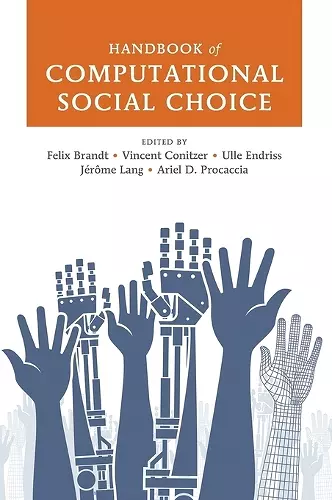Handbook of Computational Social Choice
Felix Brandt editor Vincent Conitzer editor Ulle Endriss editor Jérôme Lang editor Ariel D Procaccia editor
Format:Hardback
Publisher:Cambridge University Press
Published:25th Apr '16
Should be back in stock very soon

A comprehensive survey of computational aspects of collective decisions for graduate students, researchers, and professionals in computer science and economics.
At the intersection of computer science and economics, computational social choice deals with the computational aspects of collective decision making. This book outlines the field's major themes: voting, fair allocation, and coalition formation. Graduate students and researchers in computer science, economics, mathematics, political science, and philosophy will benefit from this book.The rapidly growing field of computational social choice, at the intersection of computer science and economics, deals with the computational aspects of collective decision making. This handbook, written by thirty-six prominent members of the computational social choice community, covers the field comprehensively. Chapters devoted to each of the field's major themes offer detailed introductions. Topics include voting theory (such as the computational complexity of winner determination and manipulation in elections), fair allocation (such as algorithms for dividing divisible and indivisible goods), coalition formation (such as matching and hedonic games), and many more. Graduate students, researchers, and professionals in computer science, economics, mathematics, political science, and philosophy will benefit from this accessible and self-contained book.
'The book offers to noneconomists an outstanding self-contained introduction to normative themes in contemporary economics and to economists a thorough discussion of the computational limits of their art. But I also recommend it to anyone with a taste for axiomatics: it is replete with new and open questions that will be with us for some time.' Hervé Moulin, from the Foreword
'… anyone who knows a fair amount about the field will find much enjoyable reading in any given chapter. Those who wish to know more should first read the compact but well-organized overview of many of the classical questions in Chapter 2, and then skip to a self-contained chapter of one's choice. Bribery? The internet? Cake cutting? It's all there, waiting for discovery.' Karl-Dieter Crisman, MAA Reviews
'Since the field of computational social choice is growing rapidly, a handbook such as this at this juncture is the need of the hour. The handbook is the product of the efforts of 36 outstanding members of the computational social choice community. It provides elaborate initiations to the major areas of the field. The handbook has already become an authoritative reference work and has been cited over 100 times since its publication. It contains many interesting open questions which will serve as fodder for hungry researchers … The book is a treasure trove of ideas from economics and computer science. Academicians, professionals, researchers, and students in many disciplines including economics, computer science, game theory, mathematics, philosophy, and political science will gain from this approachable and self-contained handbook.' S. V. Nagaraj, SIGACT News
'As a final comment, let me say that this Handbook is a most remarkable volume. I was unable to detect defects or weaknesses. All chapters are well written, with an obvious objective regarding readership. Introduction sections are clear. The authors are capable of transmitting their knowledge, whatever the difficulty. I can only repeat myself by saying that it is highly recommended to all social scientists and all computer scientists interested in voting and in social choice in general.' Maurice Salles, OEconomia
'If readers are looking for a short and concise introduction to (computational) social choice and for in-depth descriptions of essential theoretical problems and computational solutions covering a wide range of topics (voting, allocation, etc.), then this handbook may really be useful.' Roman Seidl, Journal of Artificial Societies and Social Simulation
ISBN: 9781107060432
Dimensions: 260mm x 180mm x 23mm
Weight: 1150g
548 pages